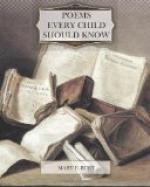So, we were left galloping,
Joris and I,
Past Looz and past Tongres,
no cloud in the sky;
The broad sun above laughed
a pitiless laugh,
’Neath our feet broke the
brittle bright stubble like chaff;
Till over by Dalhem a dome-spire
sprang white,
And “Gallop,”
gasped Joris, “for Aix is in sight!”
“How they’ll greet us!”—and
all in a moment his roan
Rolled neck and croup over,
lay dead as a stone;
And there was my Roland to
bear the whole weight
Of the news which alone could
save Aix from her fate,
With his nostrils like pits
full of blood to the brim,
And with circles of red for
his eye-sockets’ rim.
Then I cast loose my buff-coat,
each holster let fall,
Shook off both my jack-boots,
let go belt and all,
Stood up in the stirrup, leaned,
patted his ear,
Called my Roland his pet-name,
my horse without peer;
Clapped my hands, laughed
and sang, any noise, bad or good,
Till at length into Aix Roland
galloped and stood.
And all I remember is—friends
flocking round
As I sat with his head ’twixt
my knees on the ground;
And no voice but was praising
this Roland of mine,
As I poured down his throat
our last measure of wine,
Which (the burgesses voting
by common consent)
Was no more than his due who
brought the good news from Ghent.
ROBERT BROWNING.
THE BURIAL OF SIR JOHN MOORE AT CORUNNA.
“The Burial of Sir John Moore” was one
of my reading-lessons when I was a child. A
distinguished teacher says: “It has become
a part of popular education,” as has also “The
Eve of Waterloo” and “The Death of
Napoleon.” They are all poems of
great rhythmical swing, intense and graphic. (1791-1823.)
Not a drum was heard, not
a funeral note,
As his corse to
the rampart we hurried;
Not a soldier discharged his
farewell shot
O’er the
grave where our hero we buried.
We buried him darkly at dead
of night,
The sods with
our bayonets turning;
By the struggling moonbeam’s
misty light,
And the lantern
dimly burning.
No useless coffin enclosed
his breast,
Not in sheet nor
in shroud we wound him;
But he lay like a warrior
taking his rest,
With his martial
cloak around him.
Few and short were the prayers
we said,
And we spoke not
a word of sorrow;
But we steadfastly gazed on
the face that was dead,
And we bitterly
thought of the morrow.
We thought, as we hollowed
his narrow bed,
And smoothed down
his lonely pillow,
That the foe and the stranger
would tread o’er his head,
And we far away
on the billow!
Lightly they’ll talk
of the spirit that’s gone,
And o’er
his cold ashes upbraid him,—
But little he’ll reck,
if they let him sleep on
In the grave where
a Briton has laid him.




